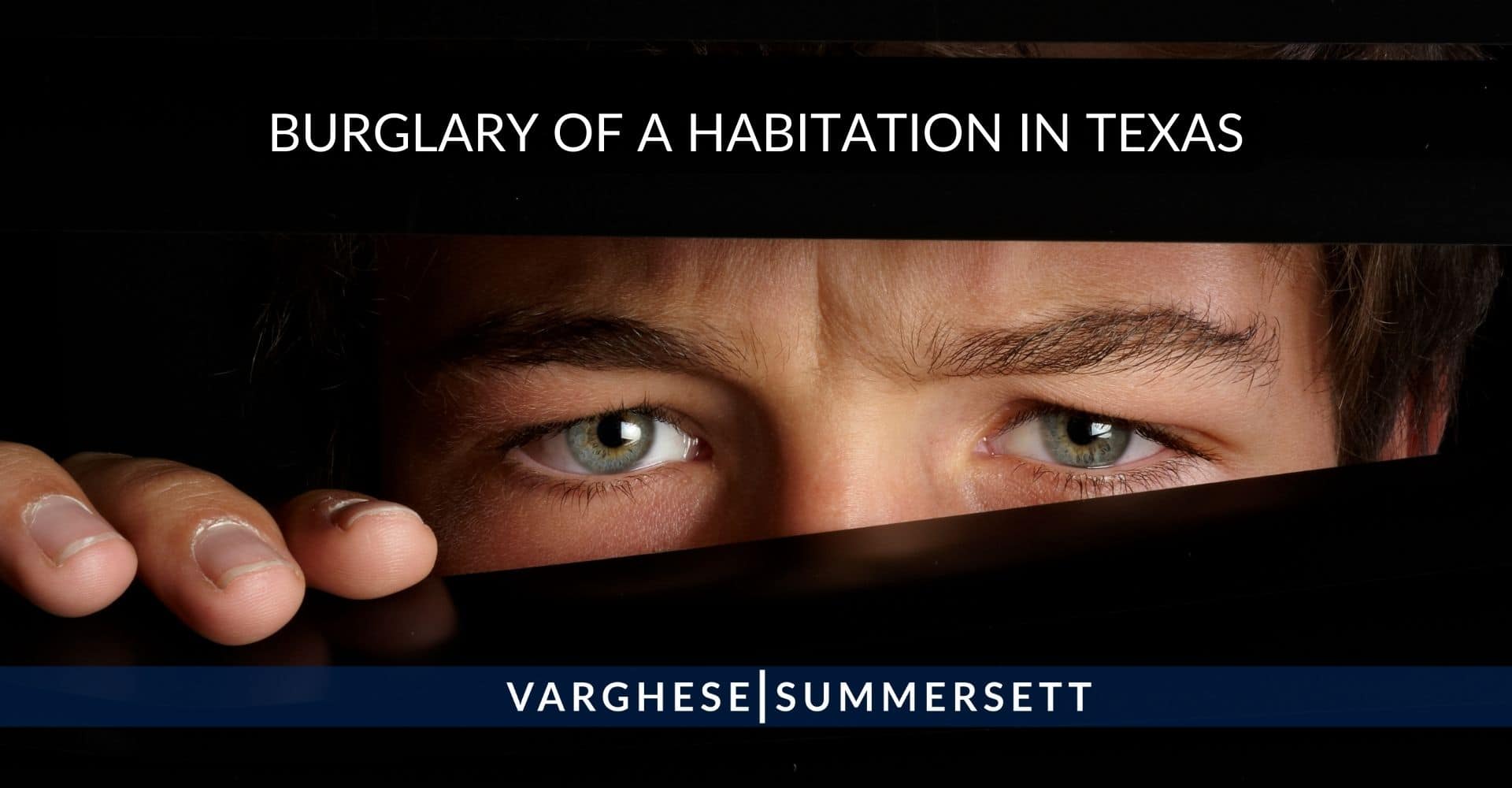Dallas Burglary of Habitation Lawyer
Dallas Burglary of Habitation Lawyer, Serving Dallas and Surrounding Areas
Did you know you can be charged with burglary of habitation in Dallas without ever stepping foot inside someone’s home? Just reaching your hand into a window, kicking open a door, or entering someone’s garage could be enough to warrant a felony charge – as long as prosecutors can prove intent.
In this article, we are going to explain the crime and consequences of breaking and entering in Dallas, and how our team defends burglary charges.
If you or a loved one is facing burglary charges, it’s imperative to contact an experienced Dallas burglary of a habitation lawyer as soon as possible. Prosecutors take these charges very seriously and will work hard to secure a conviction for unlawfully entering someone’s home or business. You will need an aggressive defense attorney who knows the nuances of the law and how to fight burglary charges.

What constitutes burglary of habitation or building in Texas?
Burglary laws are actually very broad in Texas and cover a wide array of conduct. Under Texas Penal Code 30.02, a person commits burglary if he or she, without the effective consent of the owner:
- enters a habitation or a building (or any portion of a building) not open to the public with the intent to commit a felony, theft or assault; or
- remains concealed, with intent to commit a felony, theft, or an assault, in a building or habitation; or
- enters a building or habitation and commits or attempts to commit a felony, theft or assault.
Let’s break down this definition a little more and point out some key takeaways.
- Notice that nothing has to be taken to be charged with burglary. If you enter a habitation or building with the intent to commit a felony, theft or assault, that is sufficient to be charged with burglary. So, for example, if you enter a garage with the intent to steal tools but run away when you hear something, you can still be charged with burglary of a habitation.
- It is possible to be charged with burglary without setting foot inside a habitation or building. Under Texas law, “enter” means to intrude any part of the body or any physical object connected to your body. This means if you reach your arm through a window or use a crow bar to push open a door, you can be charged with burglary.
- You can also be charged with burglary if you hide in a room of a house or business with the intent to take property after everyone leaves. Even if nothing is taken, you could be charged with burglary. So, for example, if the owner of restaurant lets you in and then you hide in the bathroom until everyone is gone with the intent to steal something, you could be charged with burglary of a building.
Notice that the definition refers to burglary of a habitation and burglary of a building. They are defined and treated differently under Texas law.
What’s the difference between burglary of habitation and burglary of building?
The biggest difference between burglary of a habitation and burglary of a building is the range of punishment. Burglary of a habitation is punished more harshly than burglary of a building

- Burglary of habitation is a second-degree felony punishable by 2 to 20 years in prison and a maximum $10,000 fine. However, it can be elevated to a first-degree felony if the person commits or attempts to commit a felony other than theft. A first-degree felony is punishable by 5 years to up to life in prison and a maximum $10,000 fine.
- Burglary of building is a state jail felony punishable by six months to two years in a state jail and a maximum $10000 fine.

If you or a loved one have been accused breaking into a house or business, your next call needs to be to a skilled Dallas burglary of a habitation lawyer. Do not discuss the allegations with anyone but a lawyer and do not cooperate with the police before retaining counsel.
What’s the difference between habitation and a building?
A habitation is defined as “a structure or vehicle that is adapted for the overnight accommodation of persons.” In other words, a place where people can sleep, such as a house, apartment, mobile home, trailer, boat, or RV. Garages are also considered habitations.
A building is defined as “any enclosed structure intended for use or occupation as a habitation or for some purpose of trade, manufacture, ornament, or use.” This would include office buildings, restaurants, warehouses, barns, storage units, etc.
As you can see, burglary of a habitation is a very serious offense. If you are charged with breaking into someone’s home or business, it is important to contact an experienced Dallas burglary of a habitation lawyer attorney right away. The sooner we can start investigating your case and building a defense, the better.
What are possible defenses to burglary of habitation or building?
An experienced Dallas burglary of a habitation lawyer will review all of the facts and circumstances of your case to determine the best possible defense. Some more common defenses include:
- You had consent from the owner to be on the property;
- You were misidentified as the person who committed burglary;
- You did not have the intent to commit theft;
- You didn’t have the intent to commit a felony;
- You didn’t have the intent to commit assault;
- The property does not meet the definition of a habitation or building under Texas law.
Contact a Dallas burglary of habitation lawyer today.
If you have been charged with burglary of a habitation or building, it’s important to contact an experienced Dallas criminal defense lawyer as soon as possible. The consequences of a burglary conviction can be serious and life-changing. Detectives often assume that you are responsible for other neighborhood break-ins and will work to pin you with other charges.
An experienced Dallas burglary of a habitation lawyer will review the facts and circumstances of your case and determine the best possible defense. Contact us today for a free consultation at 214-903-4300. We will work to protect your future and your freedom.
